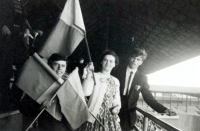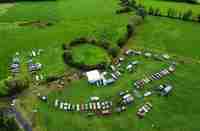How a chance meeting in a local pub opened up an exciting new world for Knockcroghery man Philip Dolan…

This week, the Roscommon People had the pleasure of sitting down with Philip Dolan, a man of many talents, one of which he has come to discover later in life: acting.
Philip spent a lifetime working abroad in the oil industry, commissioning oil fields in Africa, the Middle East, and across the globe.
On a dull April day, it was a welcome delight to enter the old railway house in Knockcroghery, where the walls and shelves were adorned with art and artefacts from around the world – mementos of Philip’s time working abroad.
My colleague Kieran and I were welcomed into the warmth of the Dolan home by Philip and his lovely wife, Marina. The couple purchased the railway house in the mid-1970s, and over the last 50 years, they have transformed it into a fine country home.
With sincerity in his voice, Philip recalls all the tears that must have eroded the doorstep of the former railway house; with all the people who must have got on the train and never come home. But their 50-odd years in the railway house in Gailey in Knockcroghery have been happy ones for Philip and Marina. Marina spent her career teaching in Ballinasloe and is an active member of the Roscommon Golf Club. Philip recalls many good times over the years when he’d be home from working abroad to enjoy the rambles in the local pubs, and indeed, many a fry was had after closing time in the Dolan home!
Acting career

As Philip regaled the patrons of Murray’s Pub in Knockcroghery some time back, he came to the attention of the acclaimed Irish film director Pat Collins. Mr Collins, having witnessed Philip in full flight, decided it was worth giving him a screen test for an upcoming adaptation of the John McGahern novel ‘That They May Face The Rising Sun’.
Things moved rather quickly from there. A week or so later, Maureen Hughes, the casting director for the film, and Pat Collins came to visit Philip at his home in Knockcroghery. Shortly after completing the screen test, a first for Philip in his 70-odd years on the planet, the phone call came to say the part was his if he wanted it, and that’s when Philip became Jamesie, the publican who plays a pivotal role in what has become an award-winner in the Best Film category at the IFTAs this week.
Filming experience
Throughout our wide-ranging conversation about life, work, retirement, and starting an acting career in his 70s, it is notable that Philip, an amateur actor by his own admission, felt so welcomed on the set by some very well-established Irish actors including Sean McGinley and Ruth McCabe, among many others.
Philip’s voice softened ever so slightly as he recalled his time in Leenane last summer, getting to know the cast and crew with whom he worked for the duration of the production.
“How did you find the experience overall? It must have been quite different from what you were used to doing in the oil industry,” I asked.
“I have to say they were some of the best weeks of my entire life. Nervous as I was, I was made to feel welcome and part of the film family,” said Philip.
Curious as to how Pat Collins ended up in Murray’s Pub in Knockcroghery to witness Philip’s original recital, I asked what he was doing in Knockcroghery on that day.
“Pat Collins was doing a documentary on Thomas McCarthy, a traveller singer who would often join us at the South Roscommon Singers Circle… and when he finished his part of the documentary, we began our session. And as I said, I can’t sing, but I do tell stories. And one of the stories I told that night struck a note with Pat, which led to the screen test we talked about”.
“Of course, McGahern’s book is set in South Leitrim but the filming was done in Leenane and around Connemara,” I noted. “I asked the same question myself and the answer will probably surprise many of your readers. The location scout couldn’t find enough unspoiled landscape in South Leitrim or North Roscommon to accurately portray the period in which the film was set,” Philip explained.
This was something that made me think about the realities of modernising large parts of rural Ireland and how unspoiled landscapes are becoming harder and harder to find throughout the country.
“Although I was made to feel welcome by everyone involved in the production, Barry Ward, one of the principal actors in the film, would often give me a thumbs up indicating that I had nailed my lines for that take. And of course, this being my first time as part of a production, I learned a lot about how scenes are shot, how settings are lit, and the various angles from which a film is shot. It was quite the experience,” said Philip.
Thoughts on McGahern
An avid reader and lover of Irish literature – evidenced by the well-packed bookshelf standing behind Philip – the Knockcroghery man amazed us with his encyclopedic knowledge of the works of John McGahern.
“The thing about McGahern was that he took a lot of inspiration from real life for the characters he inserted into his stories, and coming from a small rural area in Mohill, South Leitrim, perhaps did too good of a job describing the characters in his books, but who is to know,” explained Philip.
He continued, “McGahern held a mirror up to rural life and to be fair faced some criticism for doing so. But he was unashamed in his use and reuse of particular literary tropes which were unique to him and his style of writing”.
By his own admission, Philip wasn’t seeking to defend McGahern, but simply to point out the facts, explaining the context in which McGahern would write about the uncomfortable truths about Irish life at a particular time in our history.
“There was an attitude in Ireland at the time of ‘why are you mentioning that? Why are you bringing things like that up?’, but McGahern did”.
Local inspiration?
With McGahern deceased since 2006, we’ll probably never know the full truth about who he based Jamesie, the character Philip played in this film, on. But Philip has a fascinating theory; “I have my doubts that the character of Jamesie was at least loosely based on the great Roscommon footballer and publican from here in Knockcroghery, Jamesie Murray”.
Philip’s reasoning for this theory is rather sound as in another of McGahern’s books, he references Jimmy Murray’s famous football skills. Evidence at least that he knew the great Jamesie Murray.
“As far as I know, McGahern would frequent the factory in Athleague to sell cattle and from what I can gather would make it his business to travel as far as Jimmy Murray’s pub when business was done,” explained Philip. He continued; “and that’s why I think the character I played, Jamesie, is a nod to the late Jimmy (Jamesie) Murray”.






